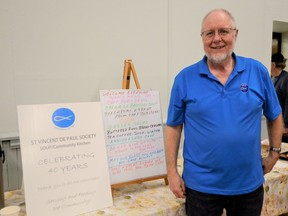
Lunch is served three times a week at a soup kitchen run by the Simcoe chapter of the St. Vincent de Paul Society from October to April.
Advertisement 2
Article content
But things get busy well before noon.
Article content
Guests filter in hours earlier to grab a coffee, get out of the cold, and get busy chatting.
“They come in here at 9:30, 10 o’clock, and there’s a buzz until mealtime,” said Gerard Van Schyndel, who co-ordinates about 50 volunteers who keep the coffee and conversation flowing.
The emphasis is on community, said Van Schyndel, a deacon in the Catholic church who opens every meal with a prayer of thanksgiving for the food and blessings for the guests and their loved ones.
“You can hear a pin drop,” he said of a silence that continues as the guests dig into what could be the only hot meal they eat that day.
On average, about 50 people drop by the hall of Trinity Anglican Church on Colborne Street South for a three-course meal that includes soup — on a recent Thursday it was cream of broccoli — a meat dish, veggies and dessert.
Advertisement 3
Article content
In February, volunteers served over 700 meals, and many more smiles and encouraging words.
“One of the most important things that people want is somebody to talk to. Somebody to treat them with a bit of respect,” Van Schyndel said.
“They don’t necessarily need you to throw money at them. They just want some companionship.”
There is no takeout service at the St. Vincent de Paul soup kitchen, which marked its fortieth year in operation April 18 before closing for the summer season.
Instead, volunteers sit and chat with the diners.
“This is a community kitchen,” Van Schyndel said. “The thrust here is not only to give them a good meal but give them a place to go in the middle of the winter, when they’re staring at four walls or the TV screen, and they can have conversation.”
Advertisement 4
Article content
A core group of clients never miss a day, while others drop in as needed.
People on social assistance and without a place to call home sit next to those working part-time at minimum-wage jobs to support their families.
“Not everyone who comes here is hungry. But they need help to stretch their dollars and pay their utility bills,” Van Schyndel said.
“Helping people make ends meet and stay in their homes is our prime objective here.”
The soup kitchen opened in 1985 at the former Knights of Columbus hall on Kent Street, serving two hot meals a week.
Then as now, the high cost of living was to blame for a growing need.
In Haldimand-Norfolk today, the local health unit says at least one in six households cannot afford enough nutritious food.
Advertisement 5
Article content
Programs like Ontario Works and the Ontario Disability Support Program are “helpful, but they’re also detrimental,” Van Schyndel said, since the monthly stipends do not cover recipients’ rent and basic needs, much less allow them to establish the financial footing to get off assistance.
“They just get buried,” Van Schyndel said. “I think the best thing possible is to guarantee everyone a living wage and work from there.”
In 2017, Kathleen Wynne’s Liberal government introduced a three-year basic income pilot project in three communities — including Hamilton — to see how people’s lives would change if they had a predictable source of income.
But the newly elected Conservative government canceled the project the following year.
Advertisement 6
Article content
Some 4,000 basic income recipients have since launched a class-action lawsuit against the Ford government, alleging breach of contract and seeking up to $200 million in damages.
“I strongly feel that government could do a better job,” Van Schyndel said.
“Problem is government doesn’t work at the grassroots. They don’t know, they don’t see.”
There are many reasons for homelessness and poverty, he added. Addiction is one, but situations at work and home can change on a dime and drive people to the street.
“You could walk down the streets of Simcoe and you don’t see anything,” he said.
“But if you walk slowly and look carefully, you’ll see lots.”
JP Antonacci is a Local Journalism Initiative Reporter based at the Hamilton Spectator. The initiative is funded by the Government of Canada.
Article content
